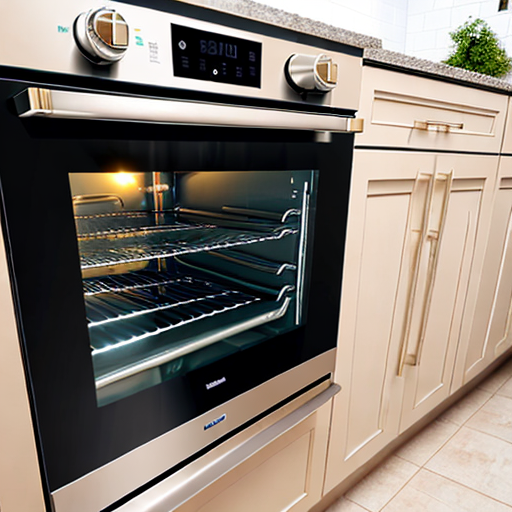Clean regularly
Regular cleaning is one of the most essential steps in keeping the oven clean and fresh. To prevent grease and food buildup, consider wiping down the oven interior after every use. To perform a quick clean, remove any loose crumbs or debris and wipe the interior with a damp sponge or cloth. Consider a mixture of water and baking soda for a deeper clean. Spread this paste over the interior of the oven and let it sit overnight or at least 15 minutes before scrubbing with a non-abrasive sponge. Afterward, you can rinse thoroughly with water to get rid of any residue.

Avoid using harsh chemical cleaners
When cleaning your oven, do not use harsh chemical cleaning solutions as they can leave strong and unpleasant odors. Instead, opt for a natural and non-toxic cleaning solution like soda paste or a mixture of water and vinegar. Not only are these options effective at removing stains and odors but also, but they also don’t leave behind harmful residues. Harsh chemicals can also damage the enamel coating of your oven, leading to rust and corrosion. The strong odors could also be harmful to your health by causing or worsening respiratory problems.
Use oven liners
Oven liners are placed at the bottom of your oven to catch any spills or drips during cooking. They can easily be removed when they get dirty making cleanup a breeze. Oven liners are made of non-stick material that prevents food from sticking at the bottom of the oven. They can also absorb grease and spills making it easier to clean up your oven after cooking. Another benefit of investing in oven liners is that they can prolong the life of your oven. By protecting the bottom of your oven from spills and food drippings, oven liners can help prevent rust and corrosion.
Address spills promptly
Food spills inside the oven are inevitable since accidents tend to happen in the kitchen. It is essential to address any spills promptly whenever they occur to prevent them from settling. Use a damp cloth or sponge to wipe away as much of the spill as possible and scrape off solid debris when the oven is still warm. This helps to prevent the spill from hardening and becoming more difficult to get rid of. If the spill is baked onto the surface of the oven, you remove it using a mild oven cleaner. For tough spills, you can apply a paste of water and baking soda and let it sit for a few minutes before scrubbing it off with a damp cloth.
Use oven-safe containers
Not all types of baking containers you buy from the local store can withstand the extreme heat inside the oven. Consider using oven-safe containers with lids when baking or roasting dishes that are prone to spilling or bubbling. Not only can they withstand the high temperatures inside an oven but can also last longer because of their durability. You can use this type of container for a variety of cooking tasks whether it is baking, roasting, or broiling. Lastly, oven-safe containers are made from materials that are not toxic and safe for food contact to avoid contamination.
Use baking soda or citrus for odor removal
You can use baking soda to remove unpleasant odors inside your oven. Sprinkle a generous amount of baking soda inside the oven and allow it to sit for several hours or overnight to absorb and neutralize odors. Afterward, use a damp cloth to wipe away the baking soda. You can also freshen your oven with lemons and oranges because they are natural deodorizers. Place the citrus peels in a baking dish with a bit of water and heat it at a low temperature in the oven.
A clean and fresh-smelling oven not only enhances your cooking experience but also prevents your meals from being tainted with unpleasant odors or burnt-on residues. Cleaning regularly, avoiding harsh chemicals, and using natural deodorizing methods are some of the ways you can keep your oven looking clean and smelling fresh for years to come.
